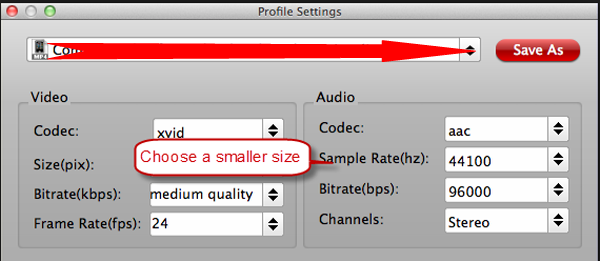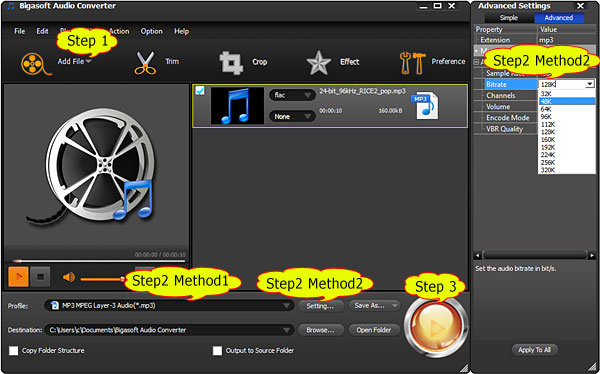
All information on FLAC assures me that regardless of compression level used the original WAV file can be reconstructed, bit perfect, from a FLAC file. Others have observed the same anomaly.Īt first, one explanation was that to increase the compression, the FLAC codec discards data, so is not truly “lossless”. Nearly all the discussion on this page is about finding the optimum trade-off between time invested in ripping a bunch of CDs and the cost of storage.Ī friend noted he could easily detect the difference between playing a CD and then playing the FLAC file of the CD through the same system – the FLAC file was inferiro to the CD. This article was signposted during a search for information on the compression of WAV files using FLAC and whether using high compression settings affects sound quality. At the rate that storage prices are dropping, FLAC 0 would seem like the obvious answer, but for so very little of an increase in encoding time, FLAC 3 makes more sense. So, ultimately, I will either rip at FLAC 0 and not worry about the additional space, or FLAC 3 if I think it will help. On a 2 TiB HDD, that doesn’t seem like a big deal, really. Is that space savings worth the roughly 50% more time to encode? Maybe or maybe not.Īt this point, my entire collection of ~391 hours of music will consume around 177 GiB if ripped at FLAC 0, and around 165 GiB if ripped at FLAC 3. That means that I will save somewhere in the neighbourhood of 12 GiB for my entire collection. However, my current collection is approximately 391 hours (or 23460 minutes). I could rip everything in FLAC 0 and call it a day, since the difference between FLAC 0 and FLAC 3 seems to be about 0.5 MiB for every minute of music. Now, are either that big of a deal by today’s standards (in both available storage capacity and processing power)? Probably not. Uncompressed WAV: 23 seconds to rip – 37.6 MiB resulting file sizeįrom both tests, it seems like FLAC compression level 3 is the right trade-off between file size and additional encoding time. Uncompressed WAV: 128 seconds to rip – 233.6 MiB resulting file size Enc + (%): The additional time required to encode as compared to FLAC 0 (as a percentage of increase)īelow you will find information about the two songs used as tests, and the results (in sortable tables):.

Enc + (sec): The additional time required to encode as compared to FLAC 0 (in seconds).Ratio (%): FLAC file size as a percentage of the original uncompressed WAV.Size (MiB): The resulting FLAC file size (rounded to tenths of a Mebibyte).Encode (sec): The time it took to encode the song.Quality: The FLAC compression level used.Intel Core i7-960 (Bloomfield) 3.20 GHZ (quad-core with Hyperthreading) Before looking at the results, here’s some information about the system used and the information contained in the results tables: That showed me the time to encode, and I substituted the compression level number (between 0 and 8 ) for ‘X’. Time flac $SONG.wav -compression-level-X -o flacX.flac I firstly ripped the two songs into uncompressed WAV files, and then encoded them into FLAC from the command line using the following code: The default FLAC compression level tends to be 5 for most applications.Īll of that being said, I decided to do a small test (n=2) with two songs. According to Wikipedia (which cites comparisons that don’t seem to directly mention decoding times), there shouldn’t be any noticeable effect on the decoding of the FLAC files based on the compression level used during encoding. Along with that benefit (higher compression results in a smaller file size), though, comes the downside of longer times to encode. The difference between the compression levels, then, is the resulting file size. So, regardless of the compression level that is chosen, FLAC will always decode into the exact uncompressed audio track (bit for bit).

#RECOMPRESS FLAC FREE#
Re-ripping a really large collection is a cumbersome task, so I wanted to make sure that I chose wisely with regard to the FLAC options that are available (particular concerning compression).Ī little background is that FLAC is the Free Lossless Audio Codec, which means that there is no loss of quality at all.
#RECOMPRESS FLAC FULL#
With the high-end pre-amp, amplifiers, DACs, and floorstanding speakers in place, my full music collection (currently ripped in OGG) will no longer be of sufficient quality. So, I’m in the process of ripping all my music to FLAC since I am getting a completely new audio system in my home. If it has helped you, please consider a small donation to The Parker Fund by using the top widget at the right. Important!This article is one of the most-viewed on The Z-Issue, and is sometimes read thousands of times per day.


 0 kommentar(er)
0 kommentar(er)
